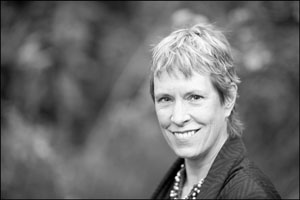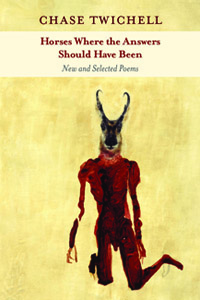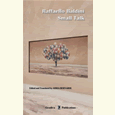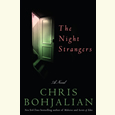No Imaginary Fences
Chase Twichell talks with Chapter 16 about practicing Zen and writing poetry in the world as it actually is
Author of seven books of poems, including a new and selected collection titled Horses Where the Answers Should Have Been), Chase Twichell applies her study of Buddhism to deliver well-chiseled, unsentimental poems that explore terrain not normally associated with Buddhist thought. Whether addressing hot-house irises, Dumpsters, or Chanel No. 5, her poems ponder questions that matter: what is the self, and why do we suffer? As a consequence, Twichell has been awarded many prestigious prizes, including the 2011 Kingsley and Kate Tufts Poetry Award, which carries a $100,000 stipend, and fellowships from the National Endowment for the Arts, the Artists Foundation, and the John Simon Guggenheim Memorial Foundation.
 Twichell is an accomplished professor and the co-editor of the influential The Practice of Poetry: Writing Exercises for Poets Who Teach, but she left academia to start a nonprofit poetry press, Ausable, which was later acquired by Copper Canyon Press. With her husband, the novelist Russell Banks, she divides her time between Miami and upstate New York, or what she calls “northern sticks and urban tropics.” Twichell recently answered questions from Chapter 16 via email about seeing “things-as-it-is” and the way that concept influences not only her poetry but also her sense of what language and nature are, and what is required to quiet the rambling mind.
Twichell is an accomplished professor and the co-editor of the influential The Practice of Poetry: Writing Exercises for Poets Who Teach, but she left academia to start a nonprofit poetry press, Ausable, which was later acquired by Copper Canyon Press. With her husband, the novelist Russell Banks, she divides her time between Miami and upstate New York, or what she calls “northern sticks and urban tropics.” Twichell recently answered questions from Chapter 16 via email about seeing “things-as-it-is” and the way that concept influences not only her poetry but also her sense of what language and nature are, and what is required to quiet the rambling mind.
Chapter 16: Much has been written about your study of Zen Buddhism and its influences on your poetry. Sometimes, as in the collection The Snow Watcher, the poems’ topics focus on your apprenticeship with Zen Buddhism. But certain poetic techniques—such as your sparse language and focused pacing—also suggest a sense of meditation, or what is called zazen. How do you see the two practices as working together?
Twichell: At first, zazen and the writing of poetry might seem to come from different planets, since one is languageless and the other expressive. But in fact, both are primarily concerned with the quality of attention one pays to the world. In zazen, we sit without moving and study, without judgment, what the mind does. The mind is very, very busy! It dislikes silence and stillness. It thinks, and thinking gets in the way of seeing things as they actually are, free of all of our associations and distractions. To me, writing poems requires the same kind of concentration, and the same patience, to let the noise of thinking subside.
Of course there are poets who are great intellectual adventurers, but I’m not one of them. I’m much more interested in how language can direct our attention toward what Suzuki-Roshi used to call things-as-it-is. That is, perception so stripped of our imaginative and associative detritus that it eludes words. Isn’t that a wonderful irony?
Chapter 16: Are there ever times when you have trouble merging the two?
Twichell: The practice of Zen and the practice of poetry are both, if taken seriously, ongoing and never-ending. In my experience of writing, the mind becomes a sort of scanner, always on the alert for things that might be seeds or ingredients for poems. I always carry paper and a pen. When I’m sitting zazen, though, of course I can’t write anything down. I can’t even follow the trail of whatever it was that struck me as possibly valuable. So the trouble isn’t with merging the two; it’s with temporarily turning off the poetry channel. If something really urgent is happening, like a suddenly-opening window into a stuck poem, I do sometimes (rarely) let myself “write” until I’ve fixed the perception solidly enough to be sure I can recall it later. Then I go back to zazen, simply observing my antic mind’s ongoing and never-ending attempts to distract itself.
Chapter 16: Many readers, when they first hear that a poet practices Zen Buddhism, will assume the poet writes primarily about nature. Your poems, however, inhabit multiple worlds—you write about nature, but also about people, memories, and urban landscapes. What are some topics that you are currently writing about?
 Twichell: Traditionally, Zen monks lived in isolated areas conducive to solitary meditation. In China and Japan, monasteries were usually situated in remote mountainous regions, so naturally the imagery reflects that. Some contemporary Zen poet-practitioners have adopted the imagery and tone of the ancient works; there’s no harm in that. But I think if we’re ready to fully take on what my teacher has called “the whole catastrophe,” we must locate ourselves in our current place and time. It seems to me far more interesting, not to mention challenging, to see the world we live in as the “natural” world, since we’re all part of the same immense ecosystem. That means no imaginary fences between nature and the trash and pollution and general despoiling we humans do. In other words, things-as-it-is, which is another name for the truth.
Twichell: Traditionally, Zen monks lived in isolated areas conducive to solitary meditation. In China and Japan, monasteries were usually situated in remote mountainous regions, so naturally the imagery reflects that. Some contemporary Zen poet-practitioners have adopted the imagery and tone of the ancient works; there’s no harm in that. But I think if we’re ready to fully take on what my teacher has called “the whole catastrophe,” we must locate ourselves in our current place and time. It seems to me far more interesting, not to mention challenging, to see the world we live in as the “natural” world, since we’re all part of the same immense ecosystem. That means no imaginary fences between nature and the trash and pollution and general despoiling we humans do. In other words, things-as-it-is, which is another name for the truth.
Last year, my husband and I bought an apartment in Miami and now spend half the year here. The other half, we’re in the Adirondack Mountains of upstate New York, about 100 miles south of Montreal. Northern sticks and urban tropics. Miami is still very alien to me: the climate, architecture, ocean, and mix of people. Whites are the minority and Spanish the predominant language. It fascinates me, but I have no genuine intimacy with it yet. People push dogs around in baby carriages, women wear five-inch platforms, there appears to be no speed limit on the highways, and people do yoga on surfboards in the middle of the bay over which we look. Jet-skis zoom around, kayaks glide, big yachts come and go. I might as well be on Neptune. Every tide brings new garbage to the shore, bottles and Styrofoam packing peanuts, condoms, flip-flops, packing tape. All of these things have begun to appear in the poems.
Chapter 16: Your poems also discuss language itself—or, rather, the limits of language. For example, in “To the Reader, If You Asked Me,” you write: “I’ve been wandering / where the cold tracks of language / collapse into cinders, unburnable trash.” In these lines, there seems to be almost a border between language and awareness, or the self. Do you see it that way?
Twichell: Yes! Huineng, the Sixth Patriarch, famously put it this way: “Truth has nothing to do with words. Truth can be likened to the moon in the sky, and words to a finger. The finger can point to the moon, but it can never be the moon. To see the moon, you have to look beyond the finger.” How terrible it would be if we could precisely and accurately paraphrase human perception! It’s said that poetry goes where prose can’t, and I’d add that Zen goes where poetry can’t. But poetry gets closer than anything else.
Chapter 16: In 2010, you published Horses Where the Answers Should Have Been: New and Selected Poems. As you were reading over your body of work, did you notice any surprising differences between the books, or any patterns that you hadn’t been aware of before?
Twichell: Deciding which poems should be preserved in a Selected and which should be left behind was no easy task. In the end, as I read back through the books, I saw that there were four or five threads I’d followed since the beginning, and which had become increasingly central to my work. So rather than attempt to compile a “greatest hits,” I chose the poems that showed an evolution in my responses to what seemed permanent questions: what is the self? Why are we destroying our world? Why do we suffer, and is there a way to alleviate that suffering? Can human consciousness penetrate the mysteries? I expect to continue asking these questions for the rest of my life.
Chapter 16: We are getting close to the year’s end when the “best of” lists start coming out. Do you have any recommendations of great books from 2012?
Twichell: Two come to mind: Sharon Olds’s Stag’s Leap, and Louise Gluck’s Poems 1962—2012. They’re both great, and about as far apart as two female voices could possibly be. I also loved Frederick Seidel’s Nice Weather. He’s probably the only poet in America who can get away with a title like that.
Chase Twichell will read from her work on November 29, in Vanderbilt’s Buttrick Hall, Room 101, at 7 p.m. The event is free and open to the public.





